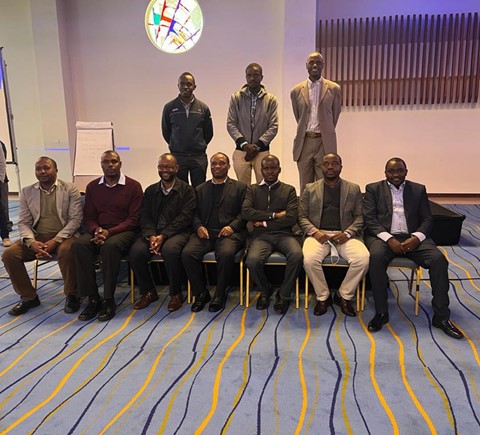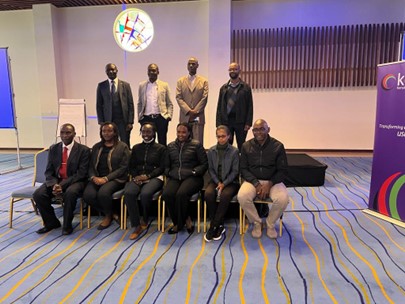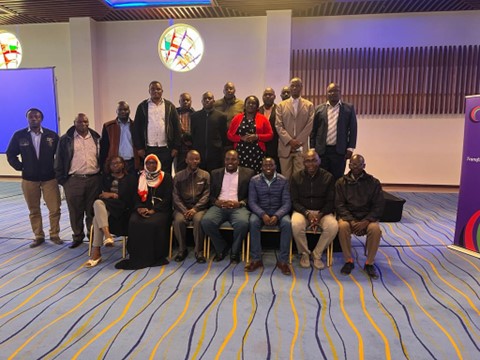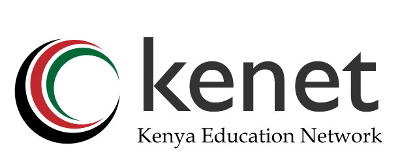You are here
KENET awards 11 small research grants to STEM early career research grantee teams
2022 SIG in Engineering Small Grants Projects
KENET awarded three (3) SIG in engineering grants to SIG in engineering with a focus on device development for Climate Resistant Agriculture (DDA), Device Development for Improved Healthcare Provision and Device Development for Environmental Monitoring.

Engineering Grantees 2022
The three (3) engineering projects are:
1. Bio signal controlled electric wheelchair for people with motor disabilities led by Dr. Waweru Njeri, of Department of Electrical Engineering, Dedan Kimathi University of Technology.
2. Integrated Research and Innovations in Additive Manufacturing for Customized Solutions Healthcare with lead researcher being Dr. Mutua James Mutuku, of the Department of Mechanical Engineering, Jomo Kenyatta University of Agriculture and Technology
3. UNReLo Network: LoRa Ground Network for Remote Sensing with Satellite Backhauling with the lead researcher being Dr. Cosmas Raymond Mutugi Kiruki, of the Department of Electrical and Information Engineering, University of Nairobi.
2022 SIG in Computer Science and Information Systems small grants projects

2022 CSIS Grantees
KENET awarded four (4) small grants to the following SIG in CSIS research teams:
1. Machine Learning (ML) Tools for Decision Support and Modelling of Public Health Care Resources with the lead researcher being Dr. Betsy Muriithi, research fellow, iLab Africa, Strathmore University.
Other team Members include Dr Joseph Sevilla, Director iLab Africa (Strathmore University) and Dr. John Olukuru, the Director of Data Science (Strathmore University)
2. A Machine Learning approach for Estimating Maize Yield using Bio-Physical Parameters Retrieved from Remote Sensed Dataset with the team leader being Dr. Dennis Kuburu Mugambi, of the Department of Computing, Jomo Kenyatta University of Agriculture and Technology.
Other team members include Dr. Fidelis Ngugi of Tharaka University and doctoral students John Majira Makembo (Jomo Kenyatta University of Agriculture and Technology) and Edna Andeyo Abasi (Kenyatta University).
3. An Integrated Clinical Trial and Machine Learning Operations Model for Artificial Intelligence Projects in Healthcare with team leader being Dr. Moses M Thiga of the Department of Computer Science, Kabarak University.
Other team members include Dr. Pamela Kimeto of the School of Nursing, (Kabarak University) and doctoral students Daisy Ondwari (Kabarak University) and Daisy Kiptoo (Kabarak University).
4. Using Machine Learning Approaches to Infer Relationships of Insect Songs, Behavior and Weather Variables for improved Productivity of Cricket Farms for Food and Income generating in Kenya with team leader being Dr. Kennedy Senagi, International Centre of Insect Physiology and Ecology (ICIPE).
Other team members include Dr James Peter Egonyu, researcher in the Insects for Food, Feed and other Uses Programme , at ICIPE and Prof Solomon Darnell, researcher in Data Science, Artificial Intelligence and Security. (Strathmore University).
Speaking about his forum experience, Dr Kennedy Senagi, the PI from the International Centre of Insect Physiology and Ecology (ICIPE) was delighted to interact with the other grantees and get more information about the grants. “The event was very informative, and it was a pleasure meeting other grantees and discussing potential partnerships and collaborations,” said Dr Senagi.
SIG in Computer Modelling and Material Science research projects and grantees

The four (4) 2022 grantees were:
1. Machine Learning Assisted Diffuse Reflectance Spectroscopy and Molecular Modelling for Rapid Screening of Pesticide Residues - A Case Study of Chlorothalonil with Dr. Ian Kaniu, of the Applied Nuclear & Radiation Physics, University of Nairobi.
Other team members and mentors include Prof. Kenneth Kaduki of Department of Physics, University of Nairobi) Dr. Lucy Kiruri of the Department of Chemistry, Kenyatta University) and doctoral student Mr. Charles Ndegwa in the Department of Physics, University of Nairobi).
2. Exploration for anticancer natural bioactive compounds in East African plants against known human protein targets using In Silico approaches
Team Lead: Dr. Thomas Musyoka, Kenyatta University with Dr. George F. Obiero of School of Biochemistry and Biotechnology, Technical University of Kenya) as the lead researcher. Other collaborators include Dr. Caleb Kibet of ICIPE, and Dr. Steven Nyanjom of the Department of Biochemistry, Jomo Kenyatta University of Agriculture and Technology)
3. Simulation of polymer: non-fullerene acceptor (NFA) complexes within the framework of density functional theory (DFT) and time-dependent-DFT (TDDFT) with Dr. Francis Otieno, Maseno university and the team leader.
Other team members Dr. Stephen Onyango of the Department of Physics and Materials Science, Maseno University, Dr. Henry Odhiambo Otunga of the Department of Physics and Material Science, (Maseno University), Dr. Austine Mulama (Maseno University) and Dr. Isaack Motochi of Department of Physics and Materials Science, (Maasai Mara University).
4. Standard Computational Approach for the Design of Doped Carbonaceous Materials for Energy Generation and Storage Applications with
Dr. Mariam Kassim Ali, of the Department of Mining and Engineering, Jomo Kenyatta University of Agriculture and Technology. Other team members include Dr. Obiko Oirere Japheth of Department of Mechanical Engineering, Jomo Kenyatta University of Agriculture and Technology) and doctoral student Dorothy W. Maina of Department of Engineering, Dedan Kimathi University of Technology).
The winners of these small research grants 2022/2023 are expected to publish their work in reputable journals and grow a community of researchers in computational modelling.
About KENET as an NREN and Grant Organization
KENET is a not-for-profit membership organization that is incorporated as a Trust under the Trustees (Perpetual Succession) Act, Cap 164. The Trust aims to transform education using broadband Internet and ICT in teaching, learning, and research (see Trust deed 2020).
KENET’s mandate is to promote the digital transformation of administrative, teaching, learning and research in KENET member institutions using ICT. The foundation of digital transformation is the provision of basic Internet connectivity and access to cloud services. In addition, KENET promotes beyond connectivity research and education services and funds catalytic pilot projects in emerging research priority areas such as Internet of Things (IoT), Blockchain technologies and the use of virtual labs to support blended learning.
One of the key KENET services that shall be available for use by the grantee teams are software appliances on the KENET virtual lab (https://vlab.ac.ke/) which have been preconfigured with the relevant tools and the research teams will only need to select the virtual appliance that meets their application requirements, compute and storage needs. Some of the research computing tools available as pre-installed appliances include Jupyter Notebooks, RStudio, GNU Octave, Schrodinger, and Quantum Espresso, among others.
In addition to the research and education services provided by the physical infrastructure, KENET catalyzes transformation of research and educational technology by building Special Interest Groups consisting of faculty and researchers in priority academic areas of agriculture, computer science, engineering, and medicine. This is a form of researchers’ engagement and is supplemented by catalytic research and innovations grants in STEM areas through research mini grants awarded to university collaborative teams of researchers and travel grants.
